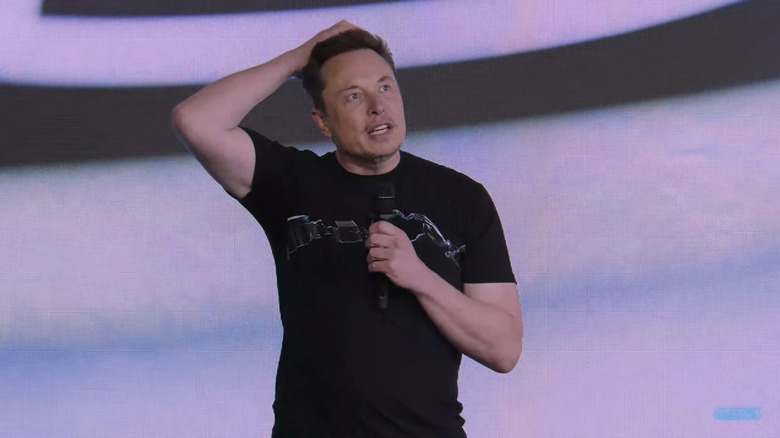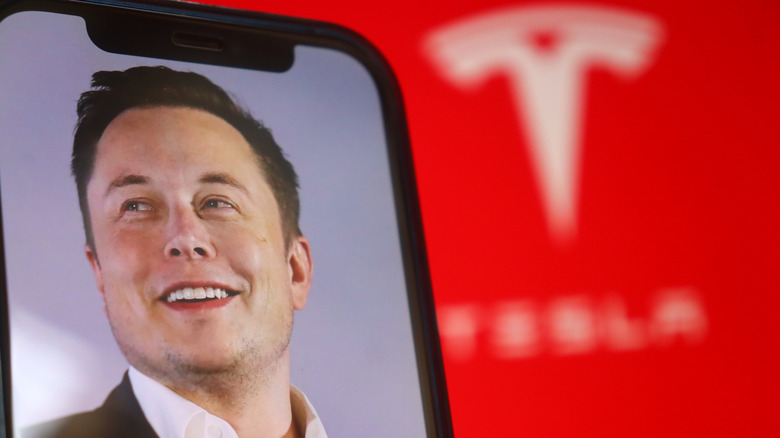There's A Reason You've Never Seen A Tesla TV Commercial
Tesla famously doesn't run TV ads for its cars. But that doesn't mean there's no Tesla advertising at all. Ahead of the annual shareholder meeting on November 6, 2025, the EV company began showing adverts on social media. Although they start off looking like a conventional car advert, they weren't trying to sell you a car. In fact, unless you're a Tesla shareholder, they weren't even for you. They were urging shareholders to "follow the board's recommendations on all proposals" to approve Elon Musk's $1 trillion compensation package. (They seemed to have worked. The deal was approved by 75% of the votes.)
So, aside from specific shareholder-target videos on social media, what is Tesla's — and Elon Musk's — stance on advertising? Why have we never seen a Cybertruck ad during the Super Bowl? Tesla doesn't spend millions of dollars on television advertising because it doesn't need to. The company promotes itself in other ways. Elon Musk once said, "I hate advertising," although that was back in 2019, before he owned X. He's revised his stance a little since then.
The company has dabbled in online advertising over the years, but its approach remains very different from big spenders like Stellantis, General Motors, and Subaru. Tesla's marketing strategy has been focused on organic, word-of-mouth recommendations and the huge media presence that is Elon Musk.
In 2023, Musk said Tesla would try a little advertising
For many years, Tesla eschewed advertising altogether. Refusing to advertise was part of the brand's identity. "Tesla does not advertise or pay for endorsements," Musk said on X (when it was still Twitter). "Instead, we use that money to make the product great." Then, in May 2023, during Tesla's annual general meeting, during the Q&A session, a Tesla shareholder asked Musk directly whether the company would begin paid advertising. Musk jokingly responded that, now that he owned Twitter, a company dependent on ad revenue, he should say that "advertising is awesome and everyone should do it".
He conceded that people who were following Tesla's social media accounts were already fans and that a new strategy would have benefits, saying, "You know what, I believe in taking suggestions, so we'll try a little advertising and see how it goes." The audience whooped and cheered in response to Musk's tentative commitment. Tesla began running glossy video ads on YouTube as well as lower-key campaigns on Facebook and Google search pages. Tesla's brief foray into advertising was also followed by an equally swift retreat. Only a few months after the company began experimenting with paid campaigns, Musk dismantled the newly formed U.S. marketing team. When a poster on X criticized Tesla's adverts, Musk agreed with them, saying, "Exactly. The ads were far too generic – could've been any car."
Tesla markets itself in other ways
Tesla doesn't do television. It barely even has a marketing team anymore. But that doesn't mean that it doesn't have a marketing strategy. Even without TV, newspaper, or billboard advertising, it still finds plenty of ways to make itself known. Tesla's X account is updated multiple times a day with news, glossy videos like this one for the Model Y, and positive content reposted from other X accounts. Elon Musk's personal account is the most followed one on X, so everything he posts about Tesla can be seen by over 200 million people. Other social media accounts are also full of Tesla drivers sharing first-hand accounts of their experience – both good and bad. Word-of-mouth has always been considered the most effective form of advertising, and it's never been easier to spread the word than it is today.
Plus, Tesla — and Elon Musk — are rarely out of the news. Tesla launches are widely reported and ensure global coverage. SlashGear could probably be counted as part of Tesla's marketing strategy. Sure, we cover negative stories like Musk's biggest tech failures. But we're also quick to report on Tesla news, like when Tesla was recruiting for a manufacturing engineer for its Roadster project.
Another aspect of Tesla's marketing strategy is its long-running referral program, which effectively turns existing owners into brand ambassadors. The company also runs events like self-driving demos and workshops. However, the biggest part of Tesla's marketing is undoubtedly Musk himself. This could be considered a risky strategy. Musk is always well-liked, and the brand's success seems linked to his popularity. A study by researchers at Yale University found that Tesla may have lost more than 1 million U.S. EV sales due to Musk's "polarizing and partisan actions".


